Sourdough bread is a delightfully flavorful and nutritious loaf of bread. Though, to bake sourdough bread, you would require a great deal of patience, to make it from start to finish, and ensuring that your recipe was followed accurately in order to achieve that incredible sourdough bread rise! If you’re wondering what type of flour is best for your sourdough bread starter, then let’s dive into the deep end of flour, and what makes some of them fantastic for your sourdough starter.
Table of Contents
- What is Sourdough Starter?
- What is Bread Flour?
- About Gluten
- Finding the Protein Content in Flour
- Choosing the Right Flour for Your Sourdough Starter
- Best Flour for Sourdough Starter
- Gluten Free Flours for Sourdough Starter
- Making Sourdough Bread With Homemade Starter
- Best Flour for Sourdough Bread: Bottom Line
- FAQs
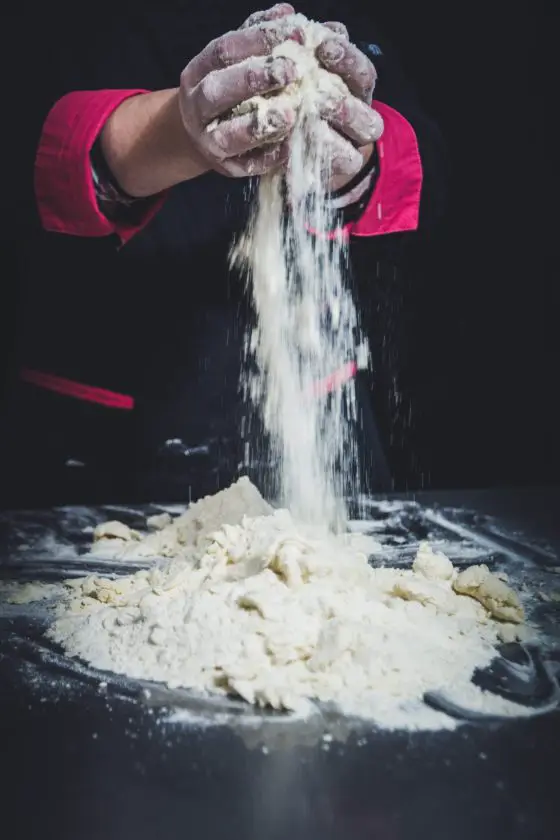
What is Sourdough Starter?
Before we begin let’s talk about sourdough starters.
Simply put a sourdough starter is a leavening agent, which is a component that’ll allow your bread to achieve that incredible rise for a perfect loaf. Think of it as the equivalent of baking soda in other baking recipes.
One of the major benefits of sourdough starter is the fact that its completely natural – and bursting with flavors of course!
Initially, a sourdough starter is a combination of flour and water, that is left for hours so that a community of wild yeast and lactic acid bacteria can begin to colonize inside your flour mixture and then feed on the new flour you add to it.
What is Bread Flour?
Bread flour or baker’s flour is a high protein, white flour that is specifically milled for baking bread like sourdough. You’ll achieve the best results from your sourdough bread once you’ve used bread flour in your starter. It’s important to study the protein content and nutritional panel of the bread flour you’re interested in using, ensuring that you’re opting for high protein flour.
About Gluten
When you’re after a good gluten development in your sourdough loaves, aim for flour with 12% protein or higher.
Once the flour becomes acquainted with water, the proteins in the flour begin the process of creating gluten. These gluten strands are stretchy, and you’ll notice them quite easily, in your starter, as well as in the dough after it has been left to set for a while.
Related Read: Is sourdough bread gluten free?
You’ll feel the elasticity in the strands when feeling the dough. This is what meshes it together, allowing it to rise by expanding along with the gases evident in fermentation.
The quantity of protein in the flour will determine how much gluten is made, as well as the overall strength of the dough.
The gluten forms and gradually builds within the initial hours of mixing. The process of kneading and folding dough stretches aligns and secures the gluten network. However, gradually this network weakens, so bear in mind that you’ll need flour that will remain strong for the amount of time you’re fermenting it.
Finding the Protein Content in Flour
Figuring out the protein content in a bag of flour is quite simple.
Simply take a glance at the label on your bag of flour. If you divert your gaze to the “nutritional values per 100g” then the amount of protein shown as a percentage is the total amount found in that particular bag of flour.
Choosing the Right Flour for Your Sourdough Starter
Organic flours that haven’t been doused in chemical treatments will most likely contain naturally occurring wild yeast and bacteria. So this might be a good place to begin.
Whole wheat flour will be able to host the wild yeasts and bacteria required to create a good sourdough starter, unlike bleached flour which is typically white flour that has been chemically bleached to create a finer texture.
Aim for whole grain flour, rye flour, or barley.
Finally, consider the type of water you’re using. Chlorinated tap water can destroy your efforts in cultivating a good yeast community, so you should always opt for filtered water for your own sourdough starter.
Using Plain Flour
Avoid using plain flour in your sourdough starters. Plain flour is made with soft wheat and doesn’t include the protein and gluten content to enable to the dough to become stretchy enough for sourdough bread. Plain flour is commonly used in biscuits, so you’ll never achieve that open crumb structure that we look for in good bread.
Expect your plain flour to produce simple loaves with tight crumbs out of small bubbles.
Organic Flour vs Non-Organic Flour for Sourdough Bread
When it comes to baking sourdough bread, we are expecting the natural organic wild yeasts to have cultivated plenty before it’s time for bread baking. Therefore, logically we should choose organic flour whenever we can to bake sourdough bread, as it is both natural and void of chemicals.
Non-organic flours are often bleached, meaning that they are chemically treated to whiten and preserve the flour. Organic flour has a higher mineral content, which is why it’s better to use in your sourdough starter, utilizing these minerals without the interference of additional chemicals.
Using Non-Organic Flour
Upon experimenting with both organic and non-organic flour in my sourdough starter I have found that using non-organic flour produces:
- a baked loaf with little to no flavor
- a good rise and structure throughout the baking process
- made my sourdough starter smell more acidic, rather than nail varnish or acetone
- sourdough starter wasn’t as active
Using Organic Flour
Both organic and non-organic flours will produce results for your dough when baking bread, but upon using organic flour, I discovered:
- my sourdough starter smelled a lot like baked bread
- provided a distinct flavour profile
- an active starter that produced a good rise
Since organic flour doesn’t contain additional chemicals, when its fermented it provides natural an diverse flavors as opposed to non-organic wheat flour. Truthfully a strong, mature sourdough starter will still bake a good bread even if you’ve used a non-organic flour.
Whole Wheat Flour vs White Flour
Using whole wheat flour as opposed to white flour will impact the overall flavour and texture of your whole wheat bread.
Essentially, whole wheat flour contains the entire grain of wheat, which includes the bran, and this is found on the outer part of the wheat berry. The bran is:
- rich in fibre and minerals
- and provides the most flavour to your sourdough bread
The endosperm which is the inner part of the wheat berry is:
- rich in starch, containing carbs and proteins
- This plays an important role in the gluten development in your bread
Finally, the germ which is essentially a small portion of the wheat berry is rich in vitamins and beneficial fats.
On the other hand white flour, contains much less bran and germ, with mostly endosperm left over depending on how finely it was milled. Using whole wheat flour in sourdough bread will provide:
- a complex flavour thanks to the minerals found in the bran
- a dense and heavily textured bread
Using white flour will result in:
- a light and soft textured bread, with larger holes (open crumb)
- a simple flavour profile
In the end, the more wholemeal you have in your sourdough starter, the more dense your baked loaf will be. Knowing this will push you to manipulate your flour blends in creating a loaf that is exactly how you want it to be in terms of flavour and crumb.
What is Stoneground Flour?
Stone ground flour is the traditional way that flour was originally milled before it was used in making bread.
To make stone ground flour you’ll need two large stone grinding the wheat berries down until it turns into flour. This process would produce whole wheat flour, with a coarse texture.
If desired, it was lightly sifted to get rid of the bran to produce white flour.
Using Stoneground Flour for Sourdough Bread
Sourdough bakers have found that stoneground flour produces a far more pleasant flavored loaf, since its particularly suited to slow fermentation.
Since it gets to keep most of its bran, stoneground flour contains more nutrients, also as the process produces less heat, because the heat is soaked into the stone rather than the berry, the heat does not damage the delicate and healthy fats in the wheat.
Furthermore, the coarser texture of stoneground flour indicates that it has a lower glycemic index, meaning that it takes longer for the body to break down. As well as this stoneground flour has taken to producing a moist crumb, therefore producing a dense loaf, with a loaf that may be a tad tedious to handle.
However, the flavor and nutrition that are evident in stoneground flour are what makes it the best and above all bread flours.
Best Flour for Sourdough Starter
Before baking sourdough bread, you may find yourself experimenting with a variety of flour brands, before finally grabbing the one that you intend to stick with indefinitely.
Palouse Brand Stone Ground White Bread Flour
This flour is particularly incredible as it is an unbleached flour with no additional additives. What’s more, you can find out the location and date this flour was harvested, which makes it all the more exciting! With the use of wheat berries and an old stone mill, you have a bag of undeniably delicious white bread flour, perfect for your sourdough starters or anything else you fancy.
Bob’s Red Mill
The flours from this company are both top quality, and milled using quartz millstones, taking their time with the grinding, ensuring that every nutritional component of the grain becomes a part of the finale – the bagged flour.
This company uses only whole grain in all of their products, so you’ll have a starter brimming with wild yeast ready for activation.
Doves Farm – Organic Strong White Bread Flour
This particular organic white flour brand is for those who prefer the taste of white flour or white bread, incredibly delicious when used to make baguettes or sourdough bread. Additionally, they have plenty of whole grain flour, for different preferences.
Allinson Strong White Bread Flour
Some may argue that this type of flour shouldn’t be used for sourdough bread, but honestly this works just as well as any other type of flour on this list. With a 13% protein content, you might find yourself loving the taste, and overall results!
Gluten Free Flours for Sourdough Starter
If you’re following a gluten free diet, or simply unable to tolerate gluten in your diet, then you can switch your regular flours for:
| Gluten-Free Flour | Name | Price | Prime | Buy | Buy |
|---|---|---|---|---|---|
 | Anthony's Brown Rice Flour Gluten-Free | PrimeEligible | Buy Now | Buy Anthony's Brown Rice Flour Gluten-Free | |
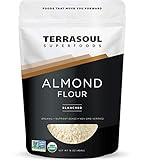 | Terrasoul Superfoods Organic Almond Flour | PrimeEligible | Buy Now | Buy Terrasoul Superfoods Organic Almond Flour | |
 | Arrowhead Mills Flour Buckwheat Organic | PrimeEligible | Buy Now | Buy Arrowhead Mills Flour Buckwheat Organic | |
 | Namaste Foods Organic Sorghum Flour Gluten Free | Prime | Buy Now | Buy Namaste Foods Organic Sorghum Flour Gluten Free |
- brown rice flour
- buckwheat flour
- quinoa flour
- amaranth flour
When you’re working towards a gluten-free sourdough starter, there are a few factors to look out for:
- Some gluten-free starters can turn sour fairly quickly, so you’ll need to feed them more often (at least 3 times a day) Keep a close eye on your starter, catering to its demands as though it were your child
- Avoid heavily starched gluten-free flours such as tapioca or sweet rice, as they have such a high sugar content, that they’ll end up obliterating the fermentation process, resulting in a bubbling, mouldy mess.
- Naturally, the gluten-free flours listed above will react differently as opposed to whole grains, whole wheat, as well as other flours. This is why you’ll find yourself spending most of your time playing around with the different ratios of flour and water once you reach the baking process.
Gluten Free Flours
- Anthony’s Brown Rice Flour
- Terrasoul Superfoods Organic Almond Flour
- Arrowhead Mills Organic Buckwheat Flour
- Namaste Foods Organic Sorghum Flour
Anthony’s Brown Rice Flour
Brown rice flour is good for baking, but only when it’s combined with other flours, due to its low protein content a combination of gluten-free flours might help its overall structure. It’s super light, and has a mild flavor so if you’re looking to bake some gluten free pancakes then this might be the one for you.
Terrasoul Superfoods Organic Almond Flour
If you’re not allergic to nuts, then almond flour is definitely worth a try.
Almond flour is made from finely ground almonds. It is high in protein, fiber and healthy fats, making it a great gluten-free flour for your sourdough starter.
Arrowhead Mills Organic Buckwheat Flour
Buckwheat flour, with its incredible nutty, earthy flavors enhances recipes that involve pancakes, biscuits, crackers, noodles, bread and more. This particular brand of buckwheat flour contains 30 grams of whole grains in every quart cup, so you can satisfy your sourdough bread cravings with healthful and beneficial gluten-free flour.
Namaste Foods Organic Sorghum Flour
Made from sorghum, this organic gluten-free flour is rich in both protein and fiber. If you’re looking for a gluten-free flour that provides your sourdough loaves with an impeccable crust, then this is the flour for you.
Making Sourdough Bread With Homemade Starter
Now that you have an understanding of the types of flour that are probably better than others when it comes to making your homemade sourdough bread, the next steps will be a piece of cake!
Making the Dough
Begin by removing 2 tablespoons of your starter, adding 100g of bread flour and water – mix well. Let it sit on your kitchen counter, away from cold air, until it doubles in size, bubbling excitedly.
Once you’re ready to bake, find yourself a large bowl and mix 200g of starter into 400g of water. Add 600g of bread flour, then use your hands to combine this all together.
Without leaving any lumps or pockets of flour and water in your dough, allow it to rest – covered – for 30 minutes. Add a sprinkle of salt, and a splash of water combining this with your hands as well, ensuring that the salt has dissolved completely.
Kneading, Proofing and Folding
You’ll find that your dough is still quite sticky, and sloppy to the touch, but now’s the time to knead it on a hard surface! If you continuously stretch, pull and roll your dough for long enough (10 minutes at least) the dough will become pleasantly smooth.
Pop your dough back onto the hard surface, dusting it lightly with some flour, flipping it over and doing the same. Fold the edges into the centre several times, until you achieve a nice ball of dough. Cover this up, and let it rest for another 30 minutes. You’ll find it flattens into a pancake shape. Repeat this process, until you’re ready for proofing.
Using a proofing basket, dust the basket with some flour, transfer your dough to the basket, and let it cool in your refrigerator, till you’re ready to bake with it tomorrow.
Baking your Sourdough Bread
Take your dough out of the fridge 2 hours before baking. A Dutch oven is a perfect place to pop your sourdough into, aiming to achieve an incredibly baked loaf of crusty bread, with an open crumb and impeccable flavors. It’s important to keep your bread covered when baking, because the steam that collects inside the Dutch oven, or regular oven is what provides your sourdough bread with its infamous crunchy crust.
Preheat your Dutch oven until it reaches 500 degrees, meanwhile gently flip your dough onto a flour dusted plate. Place your dough inside carefully, then spray your Dutch oven with water for some extra moisture. Pop the lid back on, making sure that it is closed tightly without any gaps, we don’t want any steam escaping just yet!
Once 25 minutes has gone by, remove the lid, and let your sourdough bake for a further 25 minutes.
Once time is up, allow it to cool before slicing into it with your trusty bread knife, and pair it with some of your favorite sides, for a truly tasty evening meal!
Best Flour for Sourdough Bread: Bottom Line
Whether you’re following a gluten-free diet or someone who simply loves bread, understanding the use of flour in your sourdough starters might just be your first step into succession. Especially if you’re not an avid baker.
I made a sourdough with semolina flour and einkorn sourdough bread if you’re interested in trying them! I’ve also got a beginner sourdough bread recipe you can start with.
FAQs
Is bread flour better for sourdough?
Bread flour is high in protein, which makes it the best choice for sourdough bread. White bread flour will guarantee a dough that develops a strong gluten network.
What flour is healthiest for sourdough?
Rye flour is known to be the most nutrient and amylase dense option for sourdough starter. With low gluten protein content compared to wheat flour, producing slack, sticky and dense bread.
Can I use all purpose flour instead of bread flour for sourdough?
You can certainly use all purpose flour to bake sourdough bread, but it may not always achieve the best results. This is because all purpose flour doesn’t have the higher protein content that bread flour does, therefore won’t develop a strong gluten network, or oven spring.
Is bleached or unbleached flour better for sourdough bread?
Non-organic flours are often bleaches, which means they are chemically treated to whiten the flour. Organic flour has a higher mineral content, which is why it’s a much better candidate for sourdough starter.
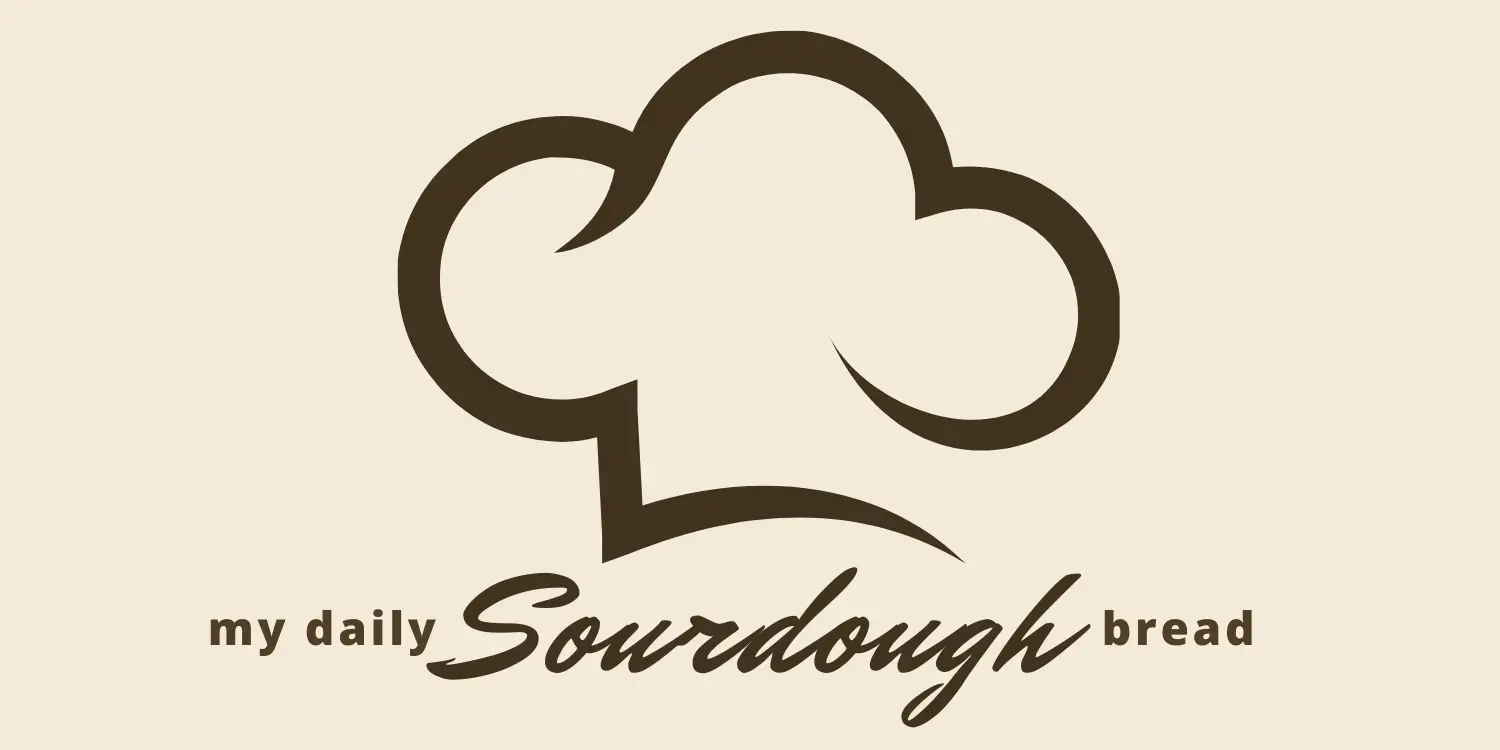














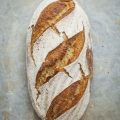
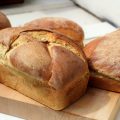
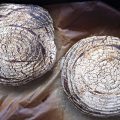
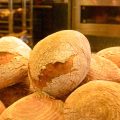
![How To Cold Proof Sourdough [Your Easy Guide] 24 How to cold proof sourdough [your easy guide]](https://www.mydailysourdoughbread.com/wp-content/uploads/2023/01/blog-images-40-120x120.jpg)
